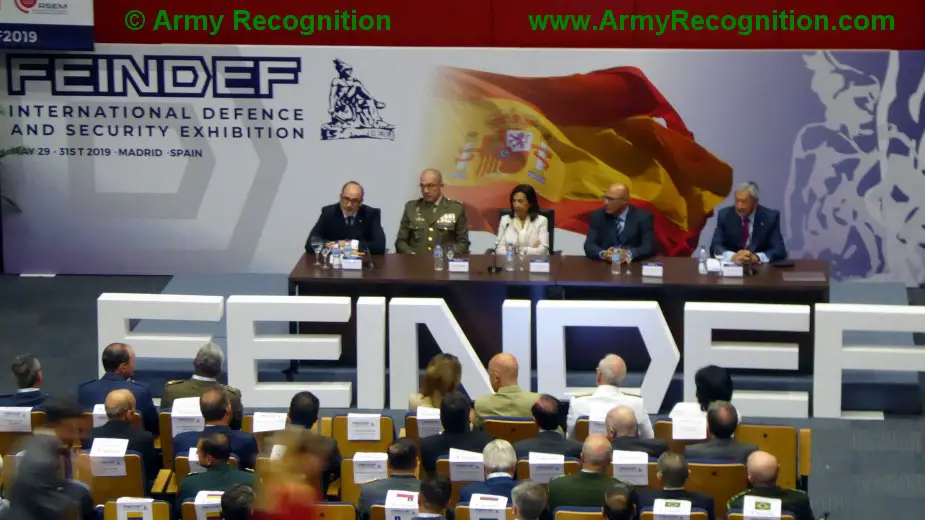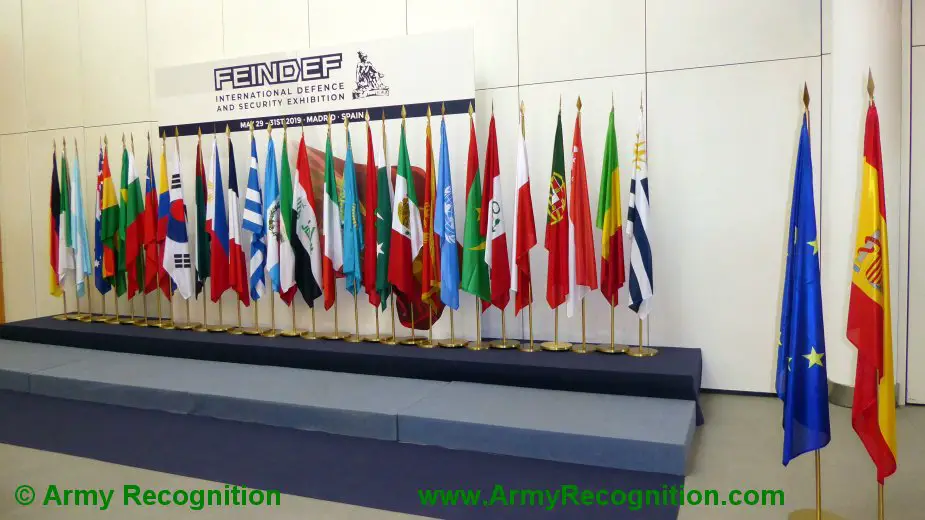Breaking news
FEINDEF 2019: Opening day of first defense exhibition in Spain.
The International Defence and Security Fair, organized in Madrid by the two Spanish business associations in the sector, TEDAE and AESMIDE, with the support of the Ministry of Defence, is the first exhibition of its kind to take place in Spain. Wednesday, May 29, was the opening day which gathered a large array of military and government authorities, as well as defense exhibitors, international delegations and professional visitors.

Opening ceremony of FEINDEF 2019 (Picture source: Army Recognition)
FEINDEF 2019 is taking place in IFEMA, Madrid, between 29th and 31st of May and is aimed at a professional audience, both from industry and the Armed Forces, Security Corps and related institutions. The Fair, which had to expand its initial exhibition space due to the high demand, has covered the 14,000 square meters of Exhibition available and has designed a program of conferences at the highest level. This area has 150 exhibitors from 11 different countries, including the main companies in the sector. In addition, numerous small and medium-sized companies that make up the supply chain will be present, accounting for more than 67% of the total number of exhibitors. The whole event was set up in nine months only.
Another highlight of FEINDEF 2019 is the presence of European defence-related institutions and 38 official delegations from 32 countries of Europe, Latin America, Africa, Asia, the Gulf region and Korea, demonstrating the many opportunities for international collaboration offered by the new European defence policy framework. As stated by the organizers, Spain intends to play a much more important role in the European defense sector, as well as act as a bridge between Europe and Latin America. FEINDEF will also be used to promote the culture and spirit of defense in the Spanish population. It will be used as a Spanish defense flag in foreign events.
Innovation and dual technology are major themes of FEINDEF. The organizers expect to surpass the 10,000 professional visitors of the sector. A sector that invoices more than 5,200 M€ per year and employs more than 42,000 people in Spain. As the organizers explained to Army Recognition, hopefully, even if organized in the framework of the Spanish Defense Forces Week, the dates won’t coincide with IDET in the Czech Republic anymore.
The organizers
TEDAE was founded in February 2009 as the Spanish Association of Defence, Security, Aeronautics and Space Technology Companies. Its mission is to give voice to its 77 member companies and promote the development of the sectors that integrate it, taking advantage of the technological link that unites them and making the common interest compatible with the singularities of each of the member companies. TEDAE's mission is also the representation and promotion of its associates both nationally and internationally.
AESMIDE, the Association of Contractor Companies with Public Administrations, was born as an interlocutor between service and supply companies and the Ministry of Defence in 1984. The association acts as a representative of its members before national and international bodies and promotes cooperation between the public and private sectors in order to propose solutions to needs and ensure mutually beneficial development.
Defence industry key to strengthening Spain's industrial and technological base
The defence and security market is one of the Spanish sectors with the greatest strength and economic projection, with a turnover of more than 5,900 million euros per year.
The sector has a high technological level, based on high investment in R&D. Being one of the sectors that invests more in R&D compared to others, exceeding 10% of turnover. It is a sector with a high added value associated with most of its activities, and it also has a high industrial and technological complexity that favours the competitiveness of our industry on an international level. Many of the technologies developed in the military field are dual in nature, which makes them useful in the civil field, thus helping to strengthen the country's technological and industrial base.
During 2016, the Defence industry employed more than 20,000 people directly and more than 22,000 indirectly. Thus, the total number of jobs associated with the Defence industry exceeded 42,000.
Internationalization
The high degree of internationalization of this industry is one of the keys to its stability. More than 83% of total turnover corresponds to exports, which in nominal terms means around 4,930 million euros per year.
Sales have been made to a total of 67 countries, through international defence programmes, international industrial cooperation agreements and direct sales. The main client of the Spanish Defence companies are International Consortiums, which account for around 36% of total defence exports. These are followed in importance by Europe (25%), the Middle East and North Africa (6%), and the United States (6%).
By market segments, aeronautics also leads the Defence export market with an advantage, accounting for more than 71% of the sector's total sales abroad. Behind this are naval with 7.8%, land vehicles with 6.1% and ancillary services with 5.7% of total export turnover.
*Official figures of the Ministry of Defence - DGAM, corresponding to the year 2016.
Fostering innovation and the dual nature of technology for the benefit of society
The interaction between universities, research centers and the defence industry has led to a merger in R&D developments, strictly "military" and "civil". The defence and security sector is aware of the need to work side by side with the civil world, promoting innovation and the dual nature of technology for the benefit of society.
Dual Technologies
The technologies that have been called dual-use are initially military developments that are finally applied in all spheres of society. These technologies constitute an important part of the Spanish industrial fabric.
Internet, GPS or microwaves are some of the best-known cases of this type of technology that were developed in response to defence needs and which became popular when the leap into the civil sphere was made.
These synergies add value to technological cooperation and the exploitation of investments, since technology is developed once and is later adapted to multiple applications.
European Programmes
The European Union is also investing resources in this type of technological development, especially with the Horizon 2020 programme, in which mechanisms have been articulated to promote the participation of different units and bodies of the Ministry of Defence to participate in various dual programmes.
COINCIDENT Programme
At the same time, the Ministry of Defence calls each year for a selection process of R&D projects "of interest to the Defence", with the aim of being included in the programme of Cooperation in Scientific Research and Development in Strategic Technologies (COINCIDENTE programme). This initiative, for the promotion of dual technologies, seeks to benefit from civil developments that can be adapted to military needs.
Defence & Security innovation Brokerage (DSiB)
This is how the entrepreneurship forum of the first edition of FEINDEF has been called, which will focus its attention on innovation and technology through a brokerage and various round tables.
The organization, in collaboration with prestigious universities, has organized a presentation of projects, in which participate Public Research Organizations (IPO), entrepreneurs, industry and end users, with the interest of promoting the exchange of ideas in the sector.
During the second day (30th May), the 20 selected projects will be presented to specialists from the university world, the Armed Forces and national and international companies in a 3x3 brokerage format (three slides in three minutes). The proposals must be framed within the areas defined by the European Defence Action Plan (EDAP): electronics, meta-materials, drones, robotics, etc.
Once the presentations are finished, representatives of the interested companies will be able to meet with those responsible for the projects that best fit their business model.
The forum will have the presence of numerous personalities among its speakers. Including the Director General of Armament and Material (DIGAM), the AL Santiago R. González Gómez, and the Deputy Director General of Coordination and Institutional Relations of the Ministry of Science and Innovation, Felipe Formariz Pombo. On the other hand, there will be a Round Table, moderated by GD Jose Luis Murga (PLATIN), in which the new European Defence Policy and the new lines of financing it brings with it will be debated.
FEINDEF, as a meeting point for the industry, will be an ideal setting to promote collaboration between companies in the sector in terms of investment in R+D and technology.
Europe moves towards a common defence policy
The European Union is taking great strides towards a common defence policy. In recent years, a multitude of initiatives has emerged to homogenise investment in this area.
The EU is the second region in the world in terms of military spending, surpassed only by the United States, which in 2015 doubled European defence spending. Despite this level of investment, its fragmentation within the EU means that between 25,000 and 100,000 million euros are considered inefficient expenditure. For example, while the US has only one model of tank, in Europe there are at least five different models, and the same applies to combat aircraft.
Each country has its own procurement policy, which means that approximately 80% of defence procurement is carried out individually, which increases the rate of duplication in the Union's systems. On the other hand, Europe continues to be highly dependent on foreign technologies, mainly the United States.
European programmes
With this data, the European Union has proposed ambitious programmes to alleviate the effects of duplication and fragmentation, as well as to promote the development of its own technologies. This is the first time that the EU has allocated EU funds to finance defence-related projects and activities.
The main project is the European Defence Action Plan (EDAP), which aims to coordinate Member States' defence investment. EDAP's most important instrument is the European Defence Fund (EDF), through which funds are channeled into research, financed directly by the EU, and development and procurement, where the EU will create incentives for Member States to cooperate with each other. This fund is expected to mobilize around €13 billion over the period 2021-2027.
Prior to EDF, the EU has created two initiatives to test the feasibility of earmarking European funds for R&D activities in the defence sector. The first of these is the Preparatory Action on Defence Research (PADR), which had a budget of 90 million euros from 2017 to 2019.
Following this, between 2019 and 2020, the EU has launched the European Defence Industry Development Programme (EDIDP). Created to promote the competitiveness, efficiency and innovation capacity of European industry and under which activities in the product and technology development phase will be supported. For EDIDP, the EU has a budget of EUR 500 million.

FEINDEF 2019 (Picture source: Army Recognition)


























